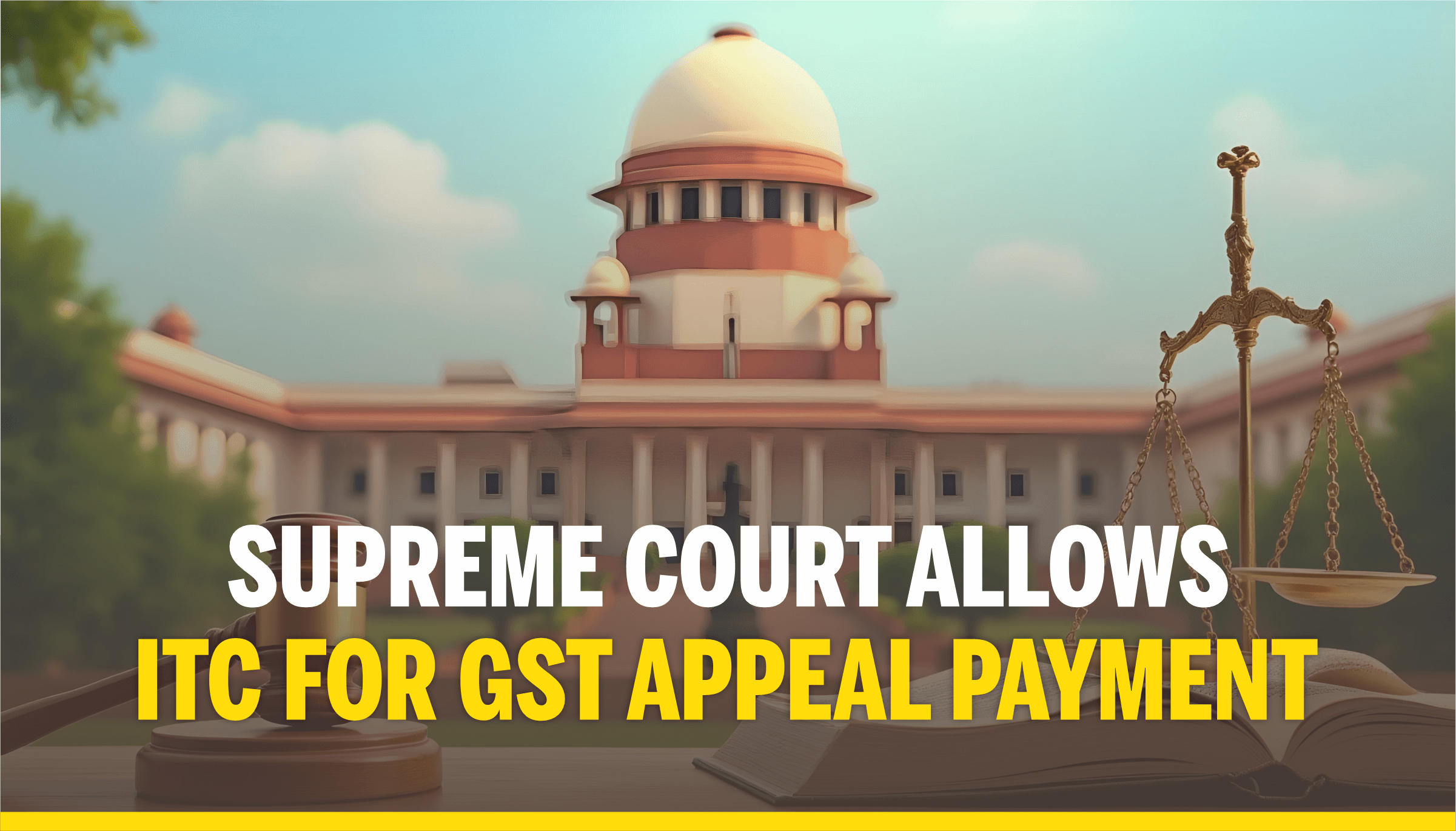Supreme Court Allows ITC for GST Appeal Payment

In a landmark judgment dated May 19, 2025, the Supreme Court of India upheld the Gujarat High Court’s verdict that allows taxpayers to use Input Tax Credit (ITC) available in the Electronic Credit Ledger (ECL) to make the mandatory 10% pre-deposit required under Section 107(6) of the Central Goods and Services Tax (CGST) Act, 2017 for filing an appeal.
This ruling has wide-ranging implications for businesses, particularly those burdened with blocked working capital and locked-in credits. The decision effectively quashes the Revenue Department’s restrictive stance that the pre-deposit must be paid strictly in cash through the Electronic Cash Ledger (ECLg), offering a major relief to taxpayers engaged in GST litigation.
Understanding the Key Concepts
What is Pre-Deposit under GST?
Under Section 107(6) of the CGST Act, an assessee aggrieved by an adjudication order must pre-deposit 10% of the disputed tax amount to file an appeal before the Appellate Authority. This is a statutory procedural requirement and not a penalty or interest.
The intent behind mandating this pre-deposit is to prevent frivolous litigation and ensure serious appeals are pursued. However, it has been under criticism for creating liquidity constraints, especially for MSMEs and exporters, who often have significant ITC balances but limited cash flow.
What is the Electronic Credit Ledger (ECL)?
The Electronic Credit Ledger, maintained on the GST portal, is a virtual ledger where a taxpayer’s accumulated Input Tax Credit is reflected. ITC is the credit available on input goods and services used in the course of business. According to Section 49(4) of the CGST Act, this credit can be utilized to pay output tax liability.
The confusion arises from whether procedural payments like the pre-deposit also qualify as “payment towards output tax,” thereby permitting use of ITC, or whether such payments must be made solely in cash.
Background of the Case: Revenue Department vs. Yasho Industries
The issue arose when Yasho Industries, a Mumbai-based manufacturer of specialty chemicals, opted to make the 10% pre-deposit using their accumulated ITC in the Electronic Credit Ledger. The Revenue Department objected, insisting that such payments must be made only via the Electronic Cash Ledger.
Yasho Industries challenged this interpretation before the Gujarat High Court, which ruled in favor of the assessee. The court observed that the law does not explicitly restrict the mode of payment for the pre-deposit. The Revenue filed a Special Leave Petition (SLP) before the Supreme Court, seeking reversal of the High Court ruling.
Legal Basis and Technical Interpretation
During the proceedings, counsel for Yasho Industries, argued that the CGST framework, especially Section 49(4) and Rule 86(2) of the CGST Rules, permits utilization of the Electronic Credit Ledger for discharging any liability permitted under the law.
Key arguments included:
-
Section 49(4) allows payment of “any amount towards output tax” using the Electronic Credit Ledger.
-
Rule 86(2) enables debiting the ECL for payments made under the Act or rules.
-
Circular No. 172/04/2022-GST, while restrictive, does not explicitly categorize pre-deposit as a penalty or interest—thus not disqualifying it from ITC usage.
The Counsel argued that the pre-deposit is a procedural requirement, not a tax per se, and the funds in the Electronic Credit Ledger are already in the government’s custody, so permitting their use for pre-deposit does not affect revenue collection.
Supreme Court’s Verdict and Its Rationale
The Supreme Court dismissed the Revenue’s SLP, effectively upholding the Gujarat High Court’s decision. The Court agreed that Section 107(6) does not prescribe the mode of payment for pre-deposit and that no statutory bar exists on using ITC for such payment.
Critically, the apex court underscored that:
-
Pre-deposit is procedural, not substantive tax liability.
-
ECL funds are already with the government, making them a legitimate means for payment.
-
Restricting payment modes through administrative interpretation violates the spirit of GST as a facilitative and seamless tax system.
This judicial endorsement provides final clarity on the matter, and no further ambiguity remains regarding the permissibility of using ITC for pre-deposits.
Implications for Taxpayers and the Industry
This ruling is a major victory for the business community, particularly for sectors like exports, MSMEs, and large industrial players with substantial ITC balances.
Key Impacts:
-
Improved Liquidity: Taxpayers can now preserve cash for operations and litigation while using ITC to comply with appeal requirements.
-
Refund Prospects: Those who previously made pre-deposits in cash may explore the possibility of refunds or adjustment against existing credits.
-
Litigation Relief: Major pending cases (e.g., Flipkart and others) involving similar disputes will now be resolved in light of this precedent.
-
Clarity and Certainty: The ruling removes confusion in GST administration and aligns the law’s interpretation with its legislative intent.
-
Strengthening Access to Justice: Procedural technicalities will no longer prevent aggrieved taxpayers from availing appellate remedies, especially where liquidity is tight.
-
Positive Signal for GST Appellate Tribunal (GSTAT): As GSTAT is expected to begin operations soon, this ruling ensures smoother functioning without unnecessary procedural litigation.
Conclusion: A Pro-Taxpayer Milestone
This Supreme Court judgment reaffirms the facilitative nature of GST and the principle that substance must prevail over form. By removing unnecessary roadblocks in the appeal mechanism and endorsing the use of existing credit balances, the Court has promoted ease of doing business and preserved the taxpayer’s constitutional right to legal remedies.
As the GST ecosystem matures, such clarificatory rulings ensure smoother compliance, reduced litigation, and a balanced approach between tax administration and taxpayer rights.
